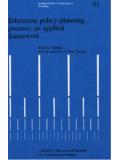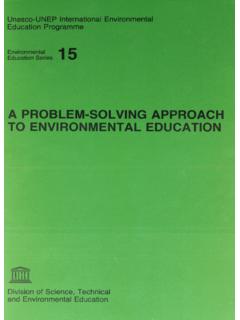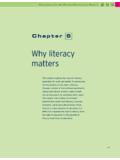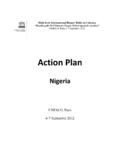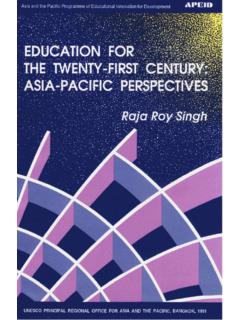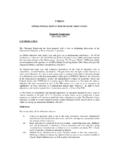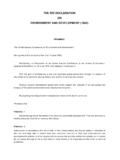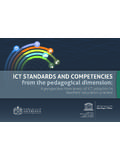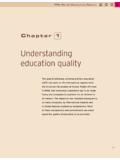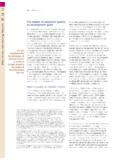Transcription of education - UNESCO
1 Designing effective monitoring and evaluation of education systems for 2030: A global synthesiss of policies and practices This is a preliminary version, not for quotation UNESCO education Sector Division for Policies and Lifelong Learning Systems (ED/PLS) Section of education Policy (ED/PLS/EDP) January 2016 TABLE OF CONTENTS TABLE OF CONTENTS .. 1 LIST OF ACRONYMS .. 2 SECTION I MONITORING AND EVALUATION IN education 5 Introduction .. Error! Bookmark not defined. Changing Context of Monitoring and Evaluation in education .. 6 SECTION II ANALYTICAL FRAMEWORK 6 Background and context.
2 Error! Bookmark not defined. Exploring M&E in education : Conceptual Framework .. 7 SECTION III MAIN FINDINGS 17 How M&E Systems in education have evolved? .. 17 What are the key factors that have contributed to/influenced the Effectiveness and Efficiency of M&E System? .. 23 How and What are the Interactions between M&E Systems and Policies? .. Error! Bookmark not defined. SECTION IV KEY POLICY LESSONS 34 Introduction .. Error! Bookmark not defined. Policy Lessons .. Error! Bookmark not defined. SECTION V RECOMMENDATIONS 43 COMPARATIVE REVIEW OF POLICIES AND PRACTICES ON MONITORING AND EVALUATION OF education SYSTEMS: 1 A SUMMARY REGIONAL REVIEW AND SELECTED COUNTRY CASE STUDIES 48 Overall Review of the Status of M&E Systems in the Asia Pacific Region.
3 48 Country Case Studies .. 56 Malaysia .. 56 Myanmar .. 57 Nepal .. 58 republic of Korea (ROK) .. 60 Overall review of the status of M&E systems in the Arab States .. 64 Country Case Studies .. 73 Jordan .. 73 Lebanon .. 75 Palestine .. 77 Egypt .. 79 Overall Review of the Status of M&E Systems in Africa .. 81 Country Case Studies .. 93 Ethiopia .. 93 South Africa .. 95 Zimbabwe .. 97 Overall Review of the Status of M&E Systems in Latin America .. 101 Country Case Studies .. 109 Brazil .. 109 Chile .. 111 2. Colombia .. 114 List of Acronyms ADEA Association for the Development of education in Africa AKF Agha Khan Foundation ANA Annual National Assessment ARNEC Asia Pacific Regional Network for Early Childhood ASER Annual Status of education Report CARICOM Caribbean Community CIDA Canadian International Development Agency CTE College of Teachers' education DBE Department of Basic education DEMMIS District education Management and Monitoring Information System DFID Department for International Development DISE District Information System for education DRC
4 democratic republic of congo ECCE Early Childhood Care and education ECD Early Childhood Development EFA education for All EMIS education Management Information System ESP education Sector Plan EU European Union FERPA Family Educational Rights and Privacy Act FBO Faith Based Organization FPE Free Primary education FMIS Financial Management Information System GDP Gross Domestic Product GER Gross Enrolment Ratios GMR Global Monitoring Report GTZ The Deutsche Gesellschaft f r Internationale Zusammenarbeit HDI Human Development Index HIV Human Immunodeficiency Virus ICFES Instituto Colombiano para el Fomento de la Educaci n I/NGOs International / Non Government Organization ICT Information and Communications Technology IIEP International Institute for Educational Planning ILO International Labour Organisation KICE Korea Institute for Curriculum and Evaluation LAC Latin America and the Caribbean M&E Monitoring and Evaluation MDGs Millennium Development Goals MEHE MOE Ministry of education NAEP National Assessment of Educational Progress NGOs Non Governmental Organisations NIE
5 National Institute of education NIER National Institute for Educational Policy Research NCHRD NORAD Norwegian Agency for Development Cooperation NUEPA National University of Educational Planning and Administration ODI Overseas Development Institute 3. OECD Organization for Economic Co operation and Development PISA Programme for International Student Assessment PTA Parent Teacher Association RBM Results Based Management SACMEQ South African Consortium for Monitoring education Quality SA SAMS School Administration and Management System SAS Student Assessment System SMC School Management Committee SRKS School Record Keeping System SMC School Management Committee SSE School Self Evaluation SSRP School Sector Reform Programme TES Teacher Evaluation System TI Transparency International TIMSS
6 Trends in International Mathematics and Science Study TMIS Teacher Management Information System TVET Technical Vocational education and Training UAE United Arab Emirates UIS UNESCO Institute for Statistics UNDP United Nations Development Programme UNESCO United Nations Educational, Scientific, and Cultural Organization UNESCWA United Nations Economic and Social Commission for Western Asia UNICEF United Nations Children's Fund USAID United States Agency for International Development WB World Bank WEO Woreda education Office WSE Whole School Evaluation 4.
7 SECTION I MONITORING AND EVALUATION IN education Introduction The current discourse on global education notes a shift in focus and the emergence of new challenges since the Dakar Global education Forum. This warrants new impetus to periodic measurements of progress made in the education sector, including the diverse nature of the education 2030 agenda that encompasses varying themes such as quality, gender, adult literacy, youth and skills, early childhood care and education , inequality and governance, marginalized populations and armed conflicts.
8 It is important to note in this context that the new education 2030 Framework for Action lays emphasis on developing and implementing a focused, evidence based and dynamic monitoring and evaluation system for the education sector in order to adequately meet the demands generated by the new challenges mentioned above. It is now generally accepted by all that sustained development hinges on good governance and accountability. In order to achieve this, stakeholders look for evidence based decision making. They believe in the crucial role of M&E systems for doing this.
9 While the proper assessment of quality aspects of the teaching learning mix is no doubt an important function of M&E, measuring the performance of other impact aspects of education , such as decentralization, school autonomy and greater accountability for outcomes, are equally important functions. Even though M&E systems form a part of every education system, many of them suffer from lack of or poor policy design and weak implementation. Most M&E systems try to measure performance; however, their precision, effectiveness and efficiency are questionable.
10 The availability of a legal framework, political will, capacity of concerned personnel, accessibility and reliability of evidence etc., are the other critical issues that influence the level of impact and the sustainability of good M&E systems. Acknowledging its mandate to support Member States in this regard, UNESCO has taken up a Comparative Review of M&E systems of the education Sector with the help of country case studies obtained from different regions. The main expected deliverable of this exercise is a global report entitled A Comparative Review of Policies and Practices of Monitoring and Evaluation of education Systems.
